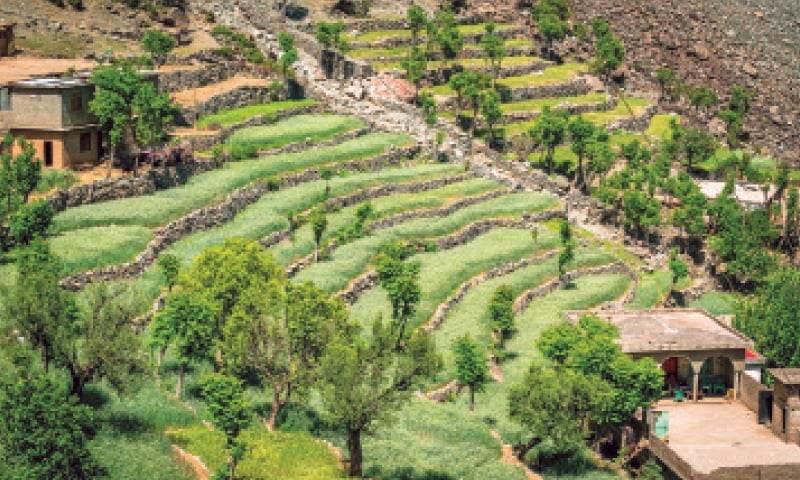Around 55 per cent of the geographical area of Pakistan is hilly or mountainous, accommodating 51.47 million people. The population of these areas is projected to rise to 72.64m by 2030.
In mountainous areas, more than half of the population is food insecure, with the highest food insecurity (60pc), prevalence of severe stunting (36pc) and underweight (42pc) in children (below 5 years age) in Balochistan.
Food security and livelihoods of mountain communities still depend heavily on agriculture and livestock. These rely on the local resource base available at all elevations, although the specific agro-ecological and livelihood potentials vary considerably.
Agriculture and livestock are highly vulnerable to climate-induced risks and hazards. These include changes in patterns of temperature and precipitation, frequent floods and droughts, and severity of changes in timings of seasons.
Climate change demands collective action at the regional level because glaciers, rivers and landscapes are trans-boundary
During hazards, the supply of food items from downstream areas is likely to be limited, particularly after landslides block roads and floods damage bridges and roads. Moreover, transportation cost of food from plain areas to mountains is also very high.
Thus, it is very important to strengthen the local agriculture in mountain areas to reduce the dependency on production systems in plain areas. Mountain agriculture has huge potential for production of nutritious traditional crops (eg millet, barley, buckwheat, seas buckthorn, native beans etc), vegetables, fruits, and nuts.
Strengthening of mountain agriculture will result in improvements of dietary diversity as well as agro-biodiversity. In 2017, Food and Agriculture Organisation’s (FAO) regional initiative on Zero Hunger Challenge in Asia and Pacific, in consultation with national and international partners relabeled traditional crops (also known as neglected and underutilised species) as ‘future smart foods’.
This was in view of their emerging importance for climate change resilience, agro-biodiversity, agriculture sustainability, and food and nutrition security. Overall, mountain agriculture can contribute significantly to achieving overarching goals of the government on reducing food insecurity in the country.
Pakistan is making progress towards framing instruments for better adaptation to climate change. However, the strategies for adaptations specific to mountain agriculture need to be further strengthened.
There are several steps which can be taken to mainstream mountains in national adaptation policies for agriculture in the Hindu Kush Himalayan (HKH) countries. According to research, local institutions are not well aware of findings of scientific studies on climate change. More focus on simple communication methods from scientists and media professionals is required.
Climate change adaptation needs to be considered a national and regional priority in all sectors, especially agriculture. However, because its impact and adaptation outcomes are long term, it is not treated as a matter of utmost importance while development goals are set based on short-term consequences.
Climate change demands collective action at regional level because glaciers, rivers and landscapes are trans-boundary and highly affected by climate change. All these have direct impact on water availability, agricultural productivity, hydropower development and disaster risk management in both mountains and downstream areas.
There is a need to invest more on mountain specific research and technology. The key challenge faced by policy makers is how to increase agricultural productivity and reduce poverty without degradation of natural resources on which mountain farmers largely depend.
The research and development interventions in Pakistan for agriculture have not been very effective because they are focused on agricultural technologies and services for plain areas. For example, agriculture research institutions rarely do research on production technology of mountain specific traditional crops.
There is urgent need for mountain specific data in Pakistan for transparent decision making in all sectors. Mostly, national databases do not reveal reliable statistics for mountains because they follow a common framework to assess vulnerability of people and systems, across both mountains and plains. Mountain areas have different climatic and socio-economic characteristics and agro-ecological potential, therefore need special attention.
Despite several constraints, the mountain areas have high potential for production of traditional crops (i.e. millets, buckwheat and beans), fruits, vegetables, and nuts. There is need to tap this potential though mountain specific research, technology and institutional services.
The writer is a doctoral candidate at the University of Central Punjab and a climate change activist sajid.hussain.media@gmail.com
Published in Dawn, The Business and Finance Weekly, May 6th, 2019














































Dear visitor, the comments section is undergoing an overhaul and will return soon.